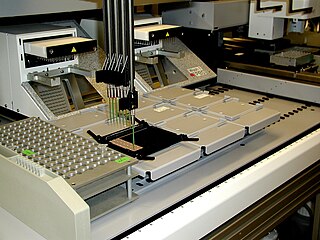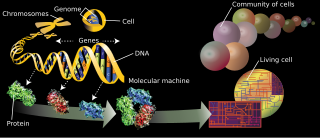Related Research Articles

The proteome is the entire set of proteins that is, or can be, expressed by a genome, cell, tissue, or organism at a certain time. It is the set of expressed proteins in a given type of cell or organism, at a given time, under defined conditions. Proteomics is the study of the proteome.

Proteomics is the large-scale study of proteins. Proteins are vital parts of living organisms, with many functions such as the formation of structural fibers of muscle tissue, enzymatic digestion of food, or synthesis and replication of DNA. In addition, other kinds of proteins include antibodies that protect an organism from infection, and hormones that send important signals throughout the body.

Leroy "Lee" Edward Hood is an American biologist who has served on the faculties at the California Institute of Technology (Caltech) and the University of Washington. Hood has developed ground-breaking scientific instruments which made possible major advances in the biological sciences and the medical sciences. These include the first gas phase protein sequencer (1982), for determining the sequence of amino acids in a given protein; a DNA synthesizer (1983), to synthesize short sections of DNA; a peptide synthesizer (1984), to combine amino acids into longer peptides and short proteins; the first automated DNA sequencer (1986), to identify the order of nucleotides in DNA; ink-jet oligonucleotide technology for synthesizing DNA and nanostring technology for analyzing single molecules of DNA and RNA.

The branches of science known informally as omics are various disciplines in biology whose names end in the suffix -omics, such as genomics, proteomics, metabolomics, metagenomics, phenomics and transcriptomics. Omics aims at the collective characterization and quantification of pools of biological molecules that translate into the structure, function, and dynamics of an organism or organisms.
Regulome refers to the whole set of regulatory components in a cell. Those components can be regulatory elements, genes, mRNAs, proteins, and metabolites. The description includes the interplay of regulatory effects between these components, and their dependence on variables such as subcellular localization, tissue, developmental stage, and pathological state.

Institute for Systems Biology (ISB) is a non-profit research institution located in Seattle, Washington, United States. ISB concentrates on systems biology, the study of relationships and interactions between various parts of biological systems, and advocates an interdisciplinary approach to biological research.
Biomarker discovery is a medical term describing the process by which biomarkers are discovered. Many commonly used blood tests in medicine are biomarkers. There is interest in biomarker discovery on the part of the pharmaceutical industry; blood-test or other biomarkers could serve as intermediate markers of disease in clinical trials, and as possible drug targets.
The Association of Biomolecular Resource Facilities (ABRF) is dedicated to advancing core and research biotechnology laboratories through research, communication, and education. ABRF members include over 2000 scientists representing 340 different core laboratories in 41 countries, including those in industry, government, academic and research institutions.

Rudolf Aebersold is a Swiss biologist, regarded as a pioneer in the fields of proteomics and systems biology. He has primarily researched techniques for measuring proteins in complex samples, in many cases via mass spectrometry. Ruedi Aebersold is a professor of Systems biology at the Institute of Molecular Systems Biology (IMSB) in ETH Zurich. He was one of the founders of the Institute for Systems Biology in Seattle, Washington, where he previously had a research group.

RRP1B, also known as KIAA0179, is a human gene which is located on Chromosome 21.

The Faculty of Science and Engineering is a constituent body of Macquarie University. The Faculty offers undergraduate and postgraduate coursework and research degree programs and is home to a number of internationally recognised research centres and also distinguished research staff. The Science Faculty is based on the Eastern half of the Academic Core at Macquarie University and is located near to the Macquarie University Research Park and the Macquarie University Hospital, thus allowing practical links with industry and research. The Faculty is renowned for its research in such areas as chiropractic science, proteomic analysis, climate risk research, environmental science and ecological studies. According to The Good Universities Guide of Australian Universities, graduates within the Faculty of Science receive starting salaries higher than those who graduate in science disciplines at other Australian universities.
The New South Wales Systems Biology Initiative, directed by Marc Wilkins is a non-profit facility within the School of Biotechnology and Biomolecular Sciences at the University of New South Wales. Their focus is undertaking basic and applied research in the development and application of bioinformatics for genomics and proteomics.

Nagendra Kumar Singh is an Indian agricultural scientist. He is presently a National Professor Dr. B.P. Pal Chair and JC Bose National Fellow at ICAR-National Institute for Plant Biotechnology, Indian Agricultural Research Institute, New Delhi. He was born in a small village Rajapur in the Mau District of Uttar Pradesh, India. He is known for his research in the area of plant genomics, genetics, molecular breeding and biotechnology, particularly for his contribution in the decoding of rice, tomato, wheat, pigeon pea, jute and mango genomes and understanding of wheat seed storage proteins and their effect on wheat quality. He has made significant advances in comparative analysis of rice and wheat genomes and mapping of genes for yield, salt tolerance and basmati quality traits in rice. He is one of the highest cited agricultural scientists from India for the last five years.
The Human Proteome Project (HPP) is a collaborative effort coordinated by the Human Proteome Organization. Its stated goal is to experimentally observe all of the proteins produced by the sequences translated from the human genome.

Ron David Appel is a Swiss bioinformatician, professor of proteomics and bioinformatics at the University of Geneva and executive director of the Swiss Institute of Bioinformatics.

Ronald Charles Beavis is a Canadian protein biochemist, who has been involved in the application of mass spectrometry to protein primary structure, with applications in the fields of proteomics and analytical biochemistry. He has developed methods for measuring the identity and post-translational modification state of proteins obtained from biological samples using mass spectrometry. He is currently best known for developing new methods for analyzing proteomics data and applying the results of these methods to problems in computational biology.
Debasis Dash is an Indian computational biologist and chief scientist at the Institute of Genomics and Integrative Biology (IGIB). Known for his research on proteomics and Big Data and Artificial Intelligence studies, his studies have been documented by way of a number of articles and ResearchGate, an online repository of scientific articles has listed 120 of them. The Department of Biotechnology of the Government of India awarded him the National Bioscience Award for Career Development, one of the highest Indian science awards, for his contributions to biosciences, in 2014. He is appointed as the director of Institute of Life Sciences, Bhubaneswar on 18 May 2023.
Nicki Packer FRSC is a distinguished professor of glycoproteomics in the School of Natural Sciences at Macquarie University and principal research leader at Griffith University's Institute for Glycomics. Packer is a Fellow of the Royal Society of Chemistry and in 2021 received the Distinguished Achievement in Proteomic Sciences Award from the Human Proteome Organization. Her research focuses on biological functional of glycoconjugates by linking glycomics with proteomics and bioinformatics.
The Institute of Bioinformatics, often referred to as IOB, is an Indian not-for-profit academic research organization based in Bangalore, India. It is involved in research in the fields of bioinformatics, multi-omics, systems biology and neurological disorders. In 2002, the institute was set up by The Genomics Research Trust and the Johns Hopkins University of Baltimore, Maryland. This organization is recognized as a 'Scientific and Industrial Research Organization' (SIRO) of the Department of Scientific and Industrial Research, Government of India. Renowned Proteomicist Akhilesh Pandey, Professor at Department of Laboratory Medicine and Pathology, Center for Individualized Medicine of Mayo Clinic in Rochester, Minnesota, USA is the Founding and current Director of IOB, and eminent Proteomicist Ravi Sirdeshmukh, Founder President of the 'Proteomic Society of India' is the current Associate Director of IOB.
References
- ↑ Wilkins, Marc R.; Sanchez, Jean-Charles; Gooley, Andrew A.; Appel, Ron D.; Humphery-Smith, Ian; Hochstrasser, Denis F.; Williams, Keith L. (1996). "Progress with Proteome Projects: Why all Proteins Expressed by a Genome Should be Identified and How To Do It". Biotechnology and Genetic Engineering Reviews. 13 (1): 19–50. doi: 10.1080/02648725.1996.10647923 . PMID 8948108.
- ↑ Wilkins, Marc R.; Pasquali, Christian; Appel, Ron D.; Ou, Keli; Golaz, Olivier; Sanchez, Jean-Charles; Yan, Jun X.; Gooley, Andrew. A.; Hughes, Graham; Humphery-Smith, Ian; Williams, Keith L.; Hochstrasser, Denis F. (1 January 1996). "From Proteins to Proteomes: Large Scale Protein Identification by Two-Dimensional Electrophoresis and Arnino Acid Analysis". Nature Biotechnology. 14 (1): 61–65. doi:10.1038/nbt0196-61. PMID 9636313. S2CID 25320181.
- ↑ Wasinger et al. Progress with gene-product mapping of the Mollicutes: Mycoplasma genitalium
- ↑ APAF - Australian Proteome Research Facility
- ↑ Wilkins et al (Eds.) Proteome Research: New Frontiers in Functional Genomics
- ↑ "Tyrian Diagnostics Pty Ltd"
- ↑ Regeneus Pty Ltd
- ↑ Marc Wilkins - UNSW researcher profile
- ↑ Systems Biology Initiative
- ↑ Ramaciotti Centre for Genomics
- ↑ Marc Wilkins - UNSW publication list
- ↑ Johnson, RN; O'Meally, D; Chen, Z; Etherington, GJ; Ho, SYW; Nash, WJ; Grueber, CE; Cheng, Y; Whittington, CM; Dennison, S; Peel, E; Haerty, W; O'Neill, RJ; Colgan, D; Russell, TL; Alquezar-Planas, DE; Attenbrow, V; Bragg, JG; Brandies, PA; Chong, AY; Deakin, JE; Di Palma, F; Duda, Z; Eldridge, MDB; Ewart, KM; Hogg, CJ; Frankham, GJ; Georges, A; Gillett, AK; Govendir, M; Greenwood, AD; Hayakawa, T; Helgen, KM; Hobbs, M; Holleley, CE; Heider, TN; Jones, EA; King, A; Madden, D; Graves, JAM; Morris, KM; Neaves, LE; Patel, HR; Polkinghorne, A; Renfree, MB; Robin, C; Salinas, R; Tsangaras, K; Waters, PD; Waters, SA; Wright, B; Wilkins, MR; Timms, P; Belov, K (2018). "Adaptation and conservation insights from the koala genome". Nat Genet. 50 (8): 1102–1111. doi:10.1038/s41588-018-0153-5. PMC 6197426 . PMID 29967444.
- ↑ ASBMB Awards